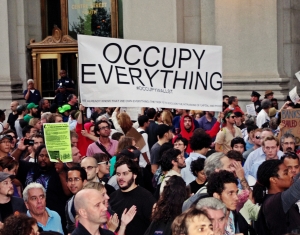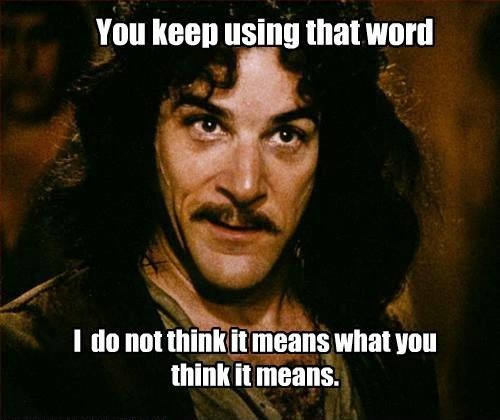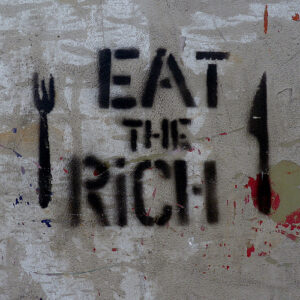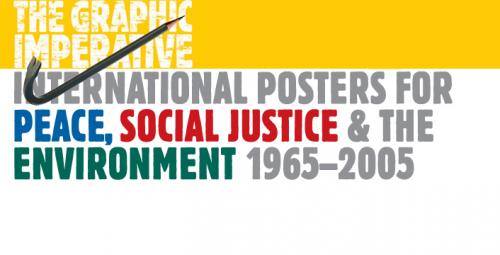Words and meanings matter.
This truth appears consistently in George Orwell’s writing and is a key theme of both 1984 and Animal Farm. In a 1946 essay titled “Politics and the English Language,” Orwell writes:
“But if thought corrupts language, language can also corrupt thought.”
As I said, words and their meanings matter. I mention this because with increasing regularity I’m hearing great Christian people with great hearts doing great thing using a certain phrase to describe their work and mission. That phrase is “social justice.”
Theologically conservative Christian colleges have added Social Justice tracks to their academic offerings. Outstanding anti-human trafficking ministries feature the phrase in their mission statements.
First of all, dear Christian reader, if you’re a regular user of the term social justice—and some of my friends and colleagues are—please know that I know what you mean when you use it. A younger generation of Christians has adopted the phrase social justice to refer to action focused on helping the poor and oppressed. But adopted from where?
Now, I don’t want to be the cranky, pedantic nitpicker. On the contrary, I want to be the cheery, pedantic nitpicker, so here’s why I wince every time I hear a real-deal evangelical Christian throw out the term “social justice” in an earnest, non-ironic way.
For decades the term was a key part of the vocabulary of Marxist revolutionaries and Catholic Liberation Theology activists in Third World countries. It was a chosen to make the ugly implications of Marxist ideology—confiscation of private property, coercive redistribution of wealth, exalting an all-powerful government into the role of a messiah/savior—more palatable to the masses and more difficult to oppose.
After all, what decent person wants to be seen as opposing “justice?” Especially the “social” kind.
This is precisely what George Orwell was warning us about.
In true Orwellian fashion, social justice became a key fixture in the vocabulary of the academic Left on college campuses all over the nation as a code phrase for messianic, utopian egalitarianism enforced coercively by a god-like State. From there, not surprisingly, it has filtered into the vocabulary of an entire generation of young, idealistic secular Americans.
In this context, the meaning of the term has begun to broaden at the edges.
Language has corrupted thought to the point that I now frequently hear it used by socialists to refer to any situation in which all “right-thinking”, i.e. politically liberal, people are supposed to be outraged that one person has more stuff than another person.
Adopting the Vocabulary of the Pagan World
 Younger (and in some cases not-so-young) Christians with a commendable and throughly biblical heart for seeing poor people lifted out of poverty have fully embraced the term social justice as a banner to wave over their cause.
Younger (and in some cases not-so-young) Christians with a commendable and throughly biblical heart for seeing poor people lifted out of poverty have fully embraced the term social justice as a banner to wave over their cause.
Here’s why that is regrettable.
First of all, “justice” is a very biblical word and you can’t read the Bible honestly without coming away with the impression that it’s something God cares very much about.
It is a joy for the just to do justice, But destruction will come to the workers of iniquity. (Proverbs 21:15)
However, if you take the time to read all the appearances of the word justice in your English Bible you’ll find that it carries a very specific meaning–and that meaning relates to punishment of criminal, lawless behavior. In other words . . .
Justice is primarily judicial, not economic.
In other words, a thing can be unfair, unfortunate, undesirable, and/or utterly unpleasant without being unjust as the Bible conceives justice. The just-ness of a thing depends entirely upon righteous legal and civil codes of law.
“Injustice” in the Bible relates to law-breakers getting away with breaking the law. Or people being defrauded out of what is rightfully theirs.
Yes, in the Bible the poor, widows and orphans are frequently mentioned in relationship to the administration of justice, precisely because they can easily get a raw deal in the court system. The wealthy can bribe judges and bureaucrats. The poor can’t.
As God makes clear to the Israelites in His detailed instructions on how to set up a civilization: “You shall not distort justice; you shall not be partial, and you shall not take a bribe, for a bribe blinds the eyes of the wise and perverts the words of the righteous.” (Deuteronomy 16:19)
 As God said to Judge Moses: “You shall not pervert the justice due to your needy brother in his dispute.” (Exodus 23:6) The Bible also recognizes the danger of justice being perverted due to pressure from populist, democratic demands. “You shall not follow the masses in doing evil, nor shall you testify in a dispute so as to turn aside after a multitude in order to pervert justice.” (Exodus 23:2)
As God said to Judge Moses: “You shall not pervert the justice due to your needy brother in his dispute.” (Exodus 23:6) The Bible also recognizes the danger of justice being perverted due to pressure from populist, democratic demands. “You shall not follow the masses in doing evil, nor shall you testify in a dispute so as to turn aside after a multitude in order to pervert justice.” (Exodus 23:2)
Both the rich individual and the poor riot mob can influence the judge or jury. Both pervert “justice.”
Contrast this biblical view of justice with the dominant pop culture view that labels any situation in which one person (or country) has more stuff that another as inherently and by definition “unjust.”
Of course, this view is impossible to square with Jesus’ parables about about Masters who entrust varying financial sums to his stewards or who pay end-of-day workers a much higher hourly rate than all-day workers.
In the dominant, liberal, pagan culture, true social justice connotes much more than concern for the lot of the poor, it requires seething hostility toward the wealthy and successful–one that values their destruction as much or more than it seeks the elevation of the poor. By embracing the term, Christians unwittingly partake of the whole noxious stew.
SJWs
Recently, another great reason for Christians to abandon the phrase social justice has emerged . . . the rise of the “Social Justice Warrior” meme. This obnoxious meme has become so ubiquitous that you rarely hear the words social justice anymore without the “warrior” noun tacked on for good measure.
The term is in part an outgrowth of a nasty, global online food fight between misogynist gamers and grim doctrinaire feminists that goes by the name and hashtag GamerGate. If you’re not familiar with this Internet war of words known as Gamergate, I won’t try to explain it here. Let it suffice to say it’s one of those conflicts like the Iran-Iraq war back in the 80s in which there is no side to root for and you just kind of wish both sides could lose.
If all the other realities I outlined above weren’t reason enough to avoid applying the term social justice to vital Kingdom work, the fact that the phrase is now forever linked to a ridiculous and degrading online war should settle it.
We’re About Redemption, Not Justice
Frankly, the work Christians are doing around the world . . . work like ending the horror of human sex slavery and rescuing the souls who have been swallowed by it’s hellish maw . . . is too important and too holy to be saddled with all the connotative baggage that accompanies the phrase social justice.
Jesus came to seek and to save that which is lost. He came not to condemn the world but to redeem it. In other words, we’re about redemption, not justice.
Words and meanings matter. And language can corrupt thought.
That’s why I wish my brothers and sisters would find a less polluted term than social justice to describe their vital redemptive work.
{More thoughts on this subject in this post.}






